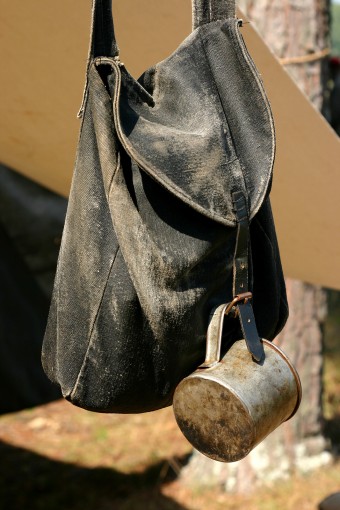Kits and Caboodles
 Meaning a complete collection of a set of related things, the curious expression the “whole kit and caboodle” has part of its origin in military life.
Meaning a complete collection of a set of related things, the curious expression the “whole kit and caboodle” has part of its origin in military life.
In the 1785 version of his A Classical Dictionary of the Vulgar Tongue, Francis Grose gives us the first mention of the word “kit” with this meaning, as well as the phrase “the whole kit”:
The kit is likewise the whole of a soldier’s necessaries, the content of his knapsack, and is used also to express the whole of different commodities; here take the whole kit, i.e. take all.
Kit, itself, is an older word, seen in use as far back as the late 1200s, and it originally meant a round wooden tub. It was derived, perhaps, from the Middle Dutch kitte, which meant alternately a jug, tankard or wooden container.
Caboodle was a more recent invention, first seen around the mid-1800s, although most authorities believe it was derived from the earlier word boodle, which entered the language around 1830. Boodle has several denotations including “phony money,” “graft money,” and “bribe money” as well as “a large amount especially of money;” it also means a collection of people, as one early usage, found in The Journal of American Folklore (1829), demonstrates: “He . . . turnd out the hol boodle of um.”
Another early reference can be found in the 1833 Down Easters where its author, J. Neal, wrote: “I know a feller twould whip the whool boodle of ’em an’ give ’em six.”
Thought to derive either from the English word bundle or the Dutch boedel (meaning property), as with caboodle, boodle originated in America.
The definition of caboodle, when standing alone, is generally limited to meaning a collection of people. Its earliest known usage can be found in the December 16, 1848 edition of the Wisconsin Democrat: “It is no use to be a ‘Son,’ it’s no use to be a whig, it’s no use to be nothin’, – I’ll cut the whole caboodle.”
It also appeared in the Ohio State Journal that same year as, “The whole caboodle will act upon the recommendation of the Ohio Sun.”
When used together with kit, it can denote a collection of things as well, and this meaning dates to the 1860s, where boodle, caboodle and kaboodle were used interchangeably. For example, in 1864, the expression was found in Theodore Winthrop’s John Brent: “Then you’re jess one quarter richer ‘n ef you owned haff, and jess three quarters richer ‘n ef you owned the hull kit and boodle of it.”
By the 1880s, New York’s The Dunkirk Observer-Journal discussed the phrase’s origins: “‘The whole kit and boodle of them’ is a New England expression in common use, and the word in this sense means the whole lot.”
Finally, together in the modern spelling, kit and caboodle, was first seen in print in 1884 in New York’s Syracuse Sunday Standard: “More audiences have been disappointed by him and by the whole kit-and-caboodle of his rivals.”
It’s generally thought that version of the expression survived over the others simply because of the rhythmic alliteration.
If you liked this article, you might also enjoy our new popular podcast, The BrainFood Show (iTunes, Spotify, Google Play Music, Feed), as well as:
- What is a Tarnation?
- The Origin of the Phrase “The Whole Nine Yards”
- Where Did the Phrase “Take a Gander” Come From?
- Why There is an Area of New York Called “The Bronx” and Why Ambulances are Called That
- What is the Origin of the Word “Tip”, as in Leaving a Tip
Bonus Facts:
- Go the Whole Hog, meaning to do something completely and thoroughly, is a phrase of American origin and traces its roots to 1828. It is sometimes attributed to the practice of purchasing an entire, slaughtered animal from a butcher, as well as an esoteric debate among Muslim sophists who were attempting to find loopholes around the prohibition against eating pork. Hog traces its roots to the late 1100s and the word hogaster, and may be of British Celtic origin.
- Lot, can be a synonym of whole kit and caboodle, and this meaning traces its origins to 1725 and the practice of auction houses to sell items in lots. The word in all its uses derives from the Proto-Germanic *khlumtom, and the Old English (500-1150 AD) hlot.
- Shebang came out of the American Civil War (1861-1865) and first meant a hut, shed or shelter. In the expression the whole shebang, it was first recorded in 1869.
- The Whole Ball of Wax has obscure origins although some claim it originated with an English legal custom, dating back to 1620, of writing the description of each parcel of land to be distributed to heirs on a piece of paper, completely encasing it in a ball of wax, placing the balls in a hat, and having the heirs draw lots. Those dissatisfied with that connection point to an 1882 article in the Atlanta Constitution, titled Look Out for Him, where it was written, “we will be greatly surprised if Mr. Sherman does not attempt to sell out the whole ball of wax under the hammer.”
- While many authorities, including apparently the OED, trace the American phrase The Whole Shooting Match (meaning everything of a collection) to 1896, earlier examples of the expression have been found, including one from 1880 and Fort Wayne, Indiana’s The Daily News: “to have the display of fire works on the 4th of July . . . parties could sit right at their south windows and take in the whole shooting match.”
| Share the Knowledge! |
|




